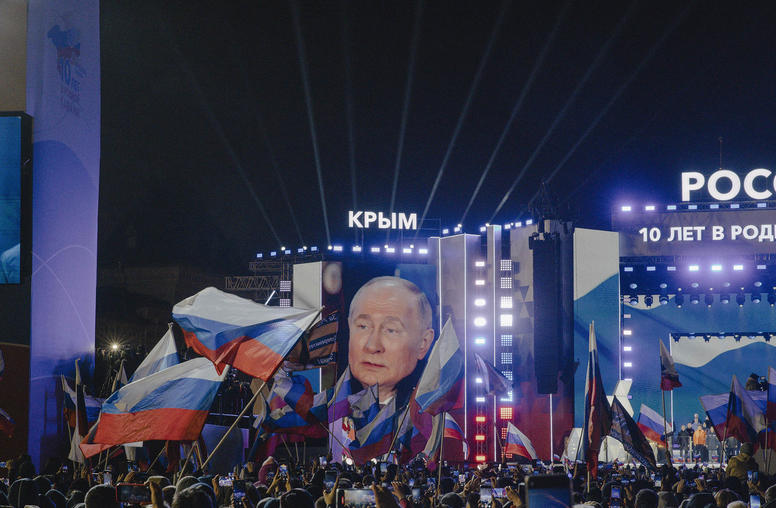Russia Pulls Back Troops—But Not Its Threat to Ukraine
The Kremlin’s years-long attack on Ukraine’s stability includes information, cyber and economic weapons.
Russian ships and trains are moving back the tens of thousands of troops massed on Ukraine’s border because, Russia’s defense minister said last week, their “surprise inspection” had “demonstrated their ability to ensure the reliable defense of the country.” In reality, the Kremlin stood down after its saber-rattling failed to unnerve the Ukrainians—and after President Biden warned President Vladimir Putin directly to drop the military threat, effectively calling the Russians’ bluff. Yet the pullback does not end Russia’s threat to Ukraine. Rather, the episode has overshadowed Moscow’s more discreet, persistent campaign to undermine the Ukrainian state.

The news that Russia’s forces will leave heavy vehicles behind, deployed near Ukraine’s border, underscores that Ukraine, Europe and their allies should stay focused on Russia’s threat. They should consider what long-term response is required to maintain their security against a method of attack that combines the flexing of military muscle with disinformation and other non-kinetic weapons. While the Kremlin announced it is backing off the military pressure this time, its broader campaign will continue.
Moscow’s way of war is “saturated in deception.” It cloaks its aggressive intentions in peaceful rhetoric. The Kremlin probes with a range of weapons, pushing forward where there is no resistance and pulling back where there is. Moscow keeps its approach below the threshold of war as conventionally understood, and it uses ambiguity “to complicate or undermine the decision-making processes,” thereby hampering a military or diplomatic response, as we saw the past few weeks. Most importantly, Moscow’s method is designed to avoid violent confrontation with the West while seeking victory through limited use of military power combined with non-kinetic means. In the conflict with Ukraine, Russia’s instruments for this campaign include signing on to cease-fire agreements which it then repeatedly violates, and the 2014 Minsk Protocol, which offers false hopes for a peaceful resolution of the conflict.
The Kremlin seeks to achieve four goals in Ukraine: provoke doubt among Ukrainians about their government’s ability to protect them; weaken popular support for President Volodymyr Zelensky; deter Ukraine’s Western partners; and create chaos to Russia’s strategic advantage.
During its troop buildup on the border, the Kremlin produced new rounds of disinformation. Moscow’s propaganda ludicrously claimed that Kyiv was preparing an invasion of the Russian-occupied Donbas. It compared the situation of ethnic Russian speakers in the region to that of the victims of Bosnia’s Srebrenica massacre in 1995, when thousands of Muslim men were killed by Serb forces. The Russian media also put out misleading messages asserting that the United States was in full control of Kyiv’s actions and that the Kyiv government was Washington’s poodle. These narratives amplify longstanding disinformation themes that the Kremlin established in response to the Ukrainian prodemocracy uprising in 2014 that challenged Russia’s influence there. These proclaim that Ukraine is a puppet of the West, that there was a “civil war” in the country, that pro-Russian fighters in the east were “separatists,” and that Ukraine was either fascist and rabidly antisemitic or a failed state.
Information operations are only one of several non-kinetic weapons the Kremlin employs. It conducts cyberattacks, weaponizes history by arguing that Ukraine is not a “real” country but merely an offshoot of Russia, and it exploits the two countries’ economic interdependence.
Ukraine’s Vulnerabilities
Ukraine’s corruption and weak institutions give the Kremlin plenty of opportunity for mischief. Well-connected, corrupt oligarchs manipulate personnel appointments and the functioning and outcomes in judicial, prosecutorial and law-enforcement institutions. The judiciary is among public institution that Ukrainians trust the least, due to widespread perceptions of corruption and political influence. These liabilities serve the interests of Russian-aligned elites in Ukraine — and thus Russia itself. And they undermine democratic stability and legitimacy.
Moscow’s efforts have had some success. Public attitudes and behaviors that underpin a nation’s resilience are difficult to measure in wartime, but there are troublesome signs of the impact of Russian malign activities, notably on the Ukrainians living in the Russian-controlled sectors of southeastern Ukraine. When two Ukrainian think tanks surveyed 800 respondents from those parts of Donbas (as those people visited government-held territory in 2019) the poll found them expressing anxiety (53 percent), hopelessness (41 percent), confusion (34 percent), fear (33 percent) about their futures. Among those polled about the sources of their information, 49 percent cited Russian TV channels and 23 percent cited media in the occupied regions.
International attention recently has properly focused on how to counter Russia’s military buildup. Ukraine and its allies blunted that avenue. But the threat is not receding. The key territory of the conflict will remain in the mind, inside the cognitive spaces of key populations (domestic and international) and key decision-makers, not just among the armed forces or even in physical space. The threat of further military escalation shapes this battle space.
Even as we welcome the Russian military drawdown, we must remember that the threat to Ukraine’s survival is not only military invasion and occupation. It is also the accumulated psychological effect on the population and leadership, as well as Western weariness, as a result of the Kremlin’s efforts to destabilize the country. Although Russia still intends to prevail in Ukraine, it does not rely primarily on military conquest, even though military power remains a crucial part of its plan. While the Kremlin may have blinked this time in the face of Ukrainian resolve and effective Western diplomacy, if its multidimensional strategy fails, force remains an option. Only if we understand the tools and scenarios that might bring about Ukraine’s defeat can we develop the efficient, cross-sectoral defense the country needs.


